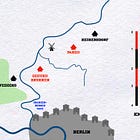Lieutenant von Clausewitz (Background)
A classic decision game
The following exercise is both a decision-forcing case and a tactical decision game. To be more precise, it places you in the position of a real-world person (Lieutenant Carl von Clausewitz) engaging a fictional problem posed to him by his teacher (Lieutenant Colonel Gerhard von Scharnhorst.)
The year is 1803, and, except for the essentially naval war between Great Britain and France, Europe is at peace. This is good news for you, Lieutenant Carl von Clausewitz, for it means that, after eleven years of military service (three of which were spent on campaign against the French), you have an opportunity to attend the Academy for Young Infantry and Cavalry Officers.
Your school is located in Berlin, capital of the Kingdom of Prussia. Many of your classes meet within that city, many in a suite in the royal palace at the center of town. Others take place out-of-doors, beyond the walls that separate Berlin from the surrounding countryside. (Berlin has no suburbs. Thus, each time that you walk through one of the many gates in the city walls, you find yourself in a world of woods, fields, and pastureland.)
The director of the Academy is Gerhard von Scharnhorst. Famous for his many writings on military subjects, Lieutenant Colonel von Scharnhorst also teaches the course on tactics. He does this by means of what he calls Aufgaben, exercises in which students write short essays that devise, describe, and defend solutions to tactical problems set in particular places at specific times. (In most instances, the places in question are located in the environs of Berlin. Likewise, the weather and light conditions with which the hypothetical commander must reckon are those of the day of the exercise.)
For Further Reading: Charles Edward White, Scharnhorst: The Formative Years 1755-1801 (Warwick: Helion and Company, 2020)
Disclaimer: Lieutenant Clausewitz serves neither as an argument for particular courses of action nor a criticism of decisions made in specific circumstances. Rather, it exists to give participants opportunities to immerse themselves in problems faced by a real person at some point in the past, and, in doing so, cultivate such martial virtues as decisiveness, critical thinking, creativity, situational awareness, and functional empathy.
To continue with this exercise, follow the link below.








If you want to practice decision forcing digitally with over 300 scenarios, and also have the ability to create your own, then get go visit the website Matrix Games .com and purchase the download "The Operational Art of War IV" The series was originally created by Norm Koger back in the 90s. Matrix Games has updated the gaming. It uses military symbology, uses the historical tables of Equpment and organization, and is turn based, you can play against the computer, play both sides yourself or play against someone else.